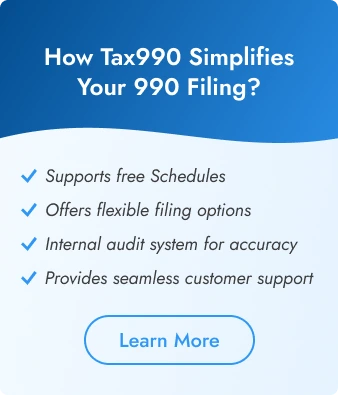What Should State-Sponsored High-Risk Health Coverage Organizations Know About Tax Exemption and
Form 990 Filing?
- Updated August 14, 2023 - 2.00 PM - Admin, Tax990
The IRS has established various IRC sections to grant tax exemption for organizations that are involved in activities that further any sort of exempt purposes, provided they meet all necessary requirements.
This article explains how the IRS defines a State-Sponsored High-Risk Health Coverage Organizations, what their 990 filing requirements are, and what important deadlines they need to keep in mind.
Table of Contents
How Does the IRS Define State-Sponsored High-Risk Health Coverage Organizations?
Per the IRC Section 501(c)(26), a State-Sponsored High-Risk Health Coverage Organizations are:
Organized and operated for the purpose of providing medical care to high-risk individuals.
The term “high-risk individuals” may include individuals, their spouses, and children who are in a pre-existing medical condition who are:
- Unable to get medical care coverage for that condition through insurance or an HMO (or)
- Able to get coverage for that condition only at a rate that is significantly higher than the rate for the same coverage from the state-sponsored organization.
How Can These Organizations Apply for Tax Exemption?
A State-Sponsored High-Risk Health Coverage Organization seeking tax-exempt status under Section 501(c)(26) can file Form 1024 - Application for Recognition of Exemption Under Section 501(a) or Section 521 of the IRC
(Internal Revenue Code).
To be eligible for exemption, organizations must fulfill the following requirements:
Should be a membership organization established by a state for the exclusive purpose of offering medical care coverage to high-risk individuals (who are state residents)
Coverage should be provided either by issuing insurance directly or by entering into an arrangement with a health maintenance organization (HMO)
None of the net earning should benefit any private shareholder or individual.
What are the 990 filing Requirements?
The State-Sponsored High-Risk Health Coverage Organizations that obtained federal tax exemption under 501(c)(26) are required to file 990 Series Forms every year to meet their annual tax filing requirements.
There are different 990 forms available, and the organizations should file the one that is
appropriate to them,
Form 990-N - Organizations with gross receipts of $50,000 or less.
Form 990-EZ - Organizations with gross receipts less than $200,000 and assets less than $500,000.
Form 990 - Organizations with gross receipts of $200,000 or more (or) assets of $500,000 or more.
Additional Filing Requirements
State-Sponsored High-Risk Health Coverage Organizations that file Form 990 or 990-EZ may be required to attach a few Schedules depending on the data they report.
If their unrelated business income is $1000 or more during the tax year, they may also be required to file Form 990-T Online.
When is the Form 990 Deadline for These Organizations?
Generally, 990 forms are due by the 15th day of the 5th month following the State-Sponsored High-Risk Health Coverage Organizations accounting
period ends.
So, for organizations that follow the calendar tax year, the deadline to file a 990 return is May 15th.
Operating on a Fiscal Tax Year? Find your 990 due date.
If this deadline falls on a Saturday, Sunday, or a holiday, the 990 return must be filed by the next business day.
Let Tax990 Simplify Form 990 E-Filing for your 501(c)(16) Organization!
As an IRS-authorized e-file provider of 990 forms, Tax990 provides State-Sponsored High-Risk Health Coverage Organizations and other tax-exempt organizations with a reliable solution to e-file their 990 returns.
Some of the amazing features offered by Tax990 are,
Free Schedules - Based on the data entered on 990 forms, our system automatically includes the required Schedule at no extra cost.
Easy filing options - Our Form-based and Interview-style filing options simplify the form
preparation process.
Built-in error check - By auditing the completed forms for IRS errors, our internal audit check ensures accurate returns.
Retransmit for free - The returns that are rejected by the IRS can be retransmitted at extra cost after fixing the errors.
Live Customer Support - We have a dedicated team of experts to handle any questions instantly via live chat, phone and email.


